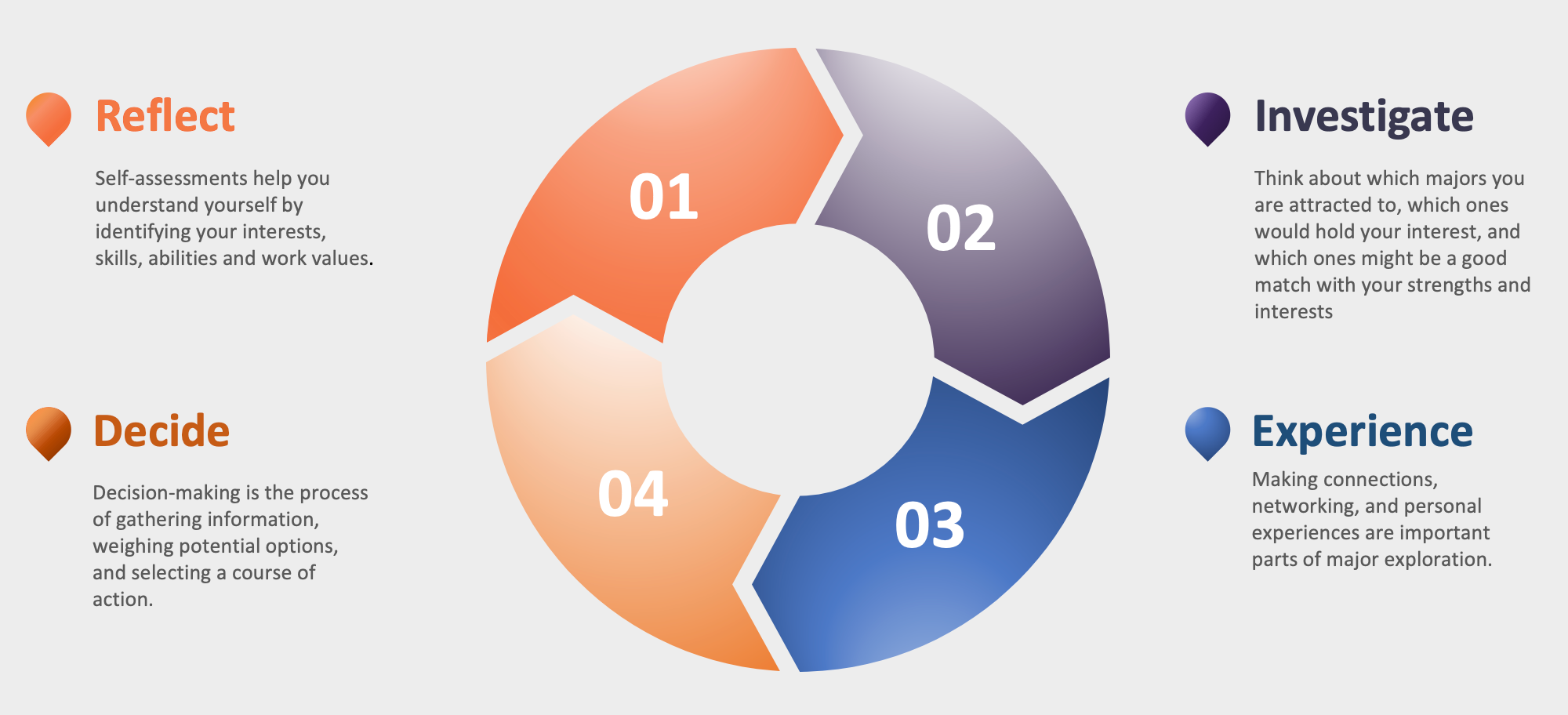Steps to Explore Majors and Careers
Exploration Guide
When you enrolled in Clemson, you may have known exactly what you wanted to do for a career; but second thoughts have popped up. Maybe you were sure of your general interests but not of a specific major and are ready to narrow your options. Perhaps a course or an event you attended sparked your interest, and you want to learn more about that particular major or career.
This guide will provide tools and resources to help explore various majors and careers. Often, there are multiple paths to the same profession.
Resources
- CECAS Majors - An overview of the majors offered by the college
- Change of Major - Semester dates and program information for other colleges
- Undergraduate Catalog - CECAS catalog, divisible by academic units
- Program Minors - Specific requirements for minors, including prerequisite courses
Decision-Making Steps

Reflect (01)
The better you know yourself, the better you will be at identifying majors and careers that will be a good fit. Self-assessments help with understanding yourself by identifying your interests, skills, abilities and work values.
The Career Center utilizes assessments as educational and exploration tools to narrow down major and career choices.
- Strong Interest Inventory: This assessment can show how your interests compare to those of professionals in hundreds of occupations.
- Myers-Briggs Type Indicator (MBTI): This Indicator lets you examine your style of communicating, making decisions, and planning – and relate your style to work environments.
- TypeFocus: This tool will assess your personality based on your preferences. Your 4-letter personality preference can give you insight into what career choices fit with your personality.
NOTE: Follow-up appointments with a career counselor are required after the completion of some of the assessments. Virtual or in-person appointments can be scheduled with a career counselor.
Research & Investigate (02)
The more you know about majors and careers, the better you can connect those to your interests, skills, abilities and work values. The best place to start is to familiarize yourself with the majors available at Clemson. Think about which majors you are attracted to, which hold your interest, and which ones would best match your strengths and interests.
Research Majors and Careers
- Clemson Undergraduate Catalog: Gives information on curriculum requirements.
- College of Engineering, Computing and Applied Science Majors: Provides an overview of the college's engineering, computing, geology majors.
- Meet the Majors Night: Provides an opportunity for students to talk with peers and departmental representatives from all CECAS majors.
- Occupational Outlook Handbook: Lists information on working conditions, salary, job setting and other important factors that can play a part in major and career exploration.
- O*Net: Presents an interactive application for searching and exploring occupations, including career exploration and assessment tools.
Investigate What Engineers Do
- ENGR 1000, Major Discovery Seminar: Listen to presentations about all ten undergraduate engineering majors given by Clemson engineering faculty or engineers working in the industry.
- Major Discovery Night: Network with Clemson alumni and industry partners at this annual Spring Event.
- Make an "Explore" appointment through CU Navigate with the major you are interested in pursuing. Note: Students not in general engineering or an engineering major interested in engineering will need to schedule an "Explore General Engineering" appointment.
- Conduct an informational interview. Talk to engineers about what they are doing and what they like and dislike about their jobs.
- Read current job postings. See what employers are looking for in the skills and responsibilities of various positions and compare that skill set to your own. There are a myriad of roles within a particular field and a variety of organizations – big companies, small companies, start-ups, government, not-for-profit, public and private – that all hire engineers.
- Explore a career by observing a professional in the field.
Experience (03)
While researching, making connections, and networking are essential parts of major exploration, sometimes a person can only know if something is right for them when they test it out firsthand.
- Join engineering-related student organizations or a professional society
- Get involved in undergraduate research
- Participate in a co-op or internship
Decide (04)
Decision-making is the process of gathering information, weighing potential options, and selecting a course of action. Everyone makes decisions differently, and there are many strategies to employ.
- Reflect: Consider information and emotions to imagine what it would be like if you carried out each option.
- Compare: Think about what you like and dislike about each option. Is there one that stands above the rest?
- Take Action: Review the requirements and the process to change your major.
